I have been dosing brightwells carbon for a few weeks now, and did dose PNS probio but haven't recently. I haven't done a waterchange in awhile because I thought that as I was doing carbon I would eventually see nitrates and phosphate go down due to the beneficial bacteria growing, but does the bacteria benefit from water changes, my nitrate and phos have been consistent without change so far, does benefical bacteria take a long time to grow?
Navigation
Install the app
How to install the app on iOS
Follow along with the video below to see how to install our site as a web app on your home screen.
Note: This feature may not be available in some browsers.
More options
You are using an out of date browser. It may not display this or other websites correctly.
You should upgrade or use an alternative browser.
You should upgrade or use an alternative browser.
Does beneficial bacteria benefit from waterchanges
- Thread starter Porcupine Reefer
- Start date
- Tagged users None
Well water changes help reestablish proper tank parameters which is beneficial to everything in your tank. I've heard carbon dosing takes awhile to build up enough bacteria to begin lowering nitrates.
How long has it been since you begun? Do you have a protein skimmer for your system?
I have a protien skimmer and filter sock, been dosing 5ml for 4 weeks nowHow long has it been since you begun? Do you have a protein skimmer for your system?
How large is your system? What were your nitrates and phosphates before you began to carbon dose? What are they now?I have a protien skimmer and filter sock, been dosing 5ml for 4 weeks now
Water changes are to remove excess nutrients, eliminate contaminants, and replace minerals which are used up by corals. As a general rule, if none of those things needs to be done, you don't need to do a water change.
That said, nitrates and phosphates are used up by algae, macroalgae, and coral. The beneficial bacteria we worry about in our reef tanks are the ones that process ammonia into nitrates.
That said, nitrates and phosphates are used up by algae, macroalgae, and coral. The beneficial bacteria we worry about in our reef tanks are the ones that process ammonia into nitrates.
I think OP is referencing the bacterium that uptake nitrate and phosphate via carbon dosing as opposed to the bacteria that convert ammonia to nitrate.Water changes are to remove excess nutrients, eliminate contaminants, and replace minerals which are used up by corals. As a general rule, if none of those things needs to be done, you don't need to do a water change.
That said, nitrates and phosphates are used up by algae, macroalgae, and coral. The beneficial bacteria we worry about in our reef tanks are the ones that process ammonia into nitrates.
- Joined
- Jun 28, 2019
- Messages
- 390
- Reaction score
- 580
For PNS ProBio, use vinegar.Takes some time for carbon dosing to kick in, be patient.
Fyi, you might dose vinegar or vodka or both.
Nitrates more than phosphates, but both.
If so how much, I dose 5ml of carbon in my tankFor PNS ProBio, use vinegar.
125 gallon tank, 50ppm nitrates and 0.5ppm phosphates. Still no changes after dosing carbon dailyHow large is your system? What were your nitrates and phosphates before you began to carbon dose? What are they now?
There's a whole lot more going on in reef systems than just the inorganic forms of nitrogen wand phosphorus we can test for. Water changes are needed to reduce labile and refractory DOC as well as microbial stuff. Reasearch shows adding labile DOC, aka carbon dosing, benefits algae microbiomes far more than coral microbiomes and has the potential to promote pathogenic shifts in coral microbiomes. Here's a data bomb if you want to look at some of the research.
Maintenance of Coral Reef Health (refferences at the end)
"Coral Reefs in the Microbial Seas" This video compliments Rohwer's book of the same title (Paper back is ~$20, Kindle is ~$10), both deal with the conflicting roles of the different types of DOC in reef ecosystems. While there is overlap bewteen his book and the video both have information not covered by the other and together give a broader view of the complex relationships found in reef ecosystems
Changing Seas - Mysterious Microbes
Microbial view of Coral Decline
Nitrogen cycling in hte coral holobiont
BActeria and Sponges
Maintenance of Coral Reef Health (refferences at the end)
Optical Feedback Loop in Colorful Coral Bleaching
DNA Sequencing and the Reef Tank Microbiome
Richard Ross What's up with phosphate"
Maintenance of Coral Reef Health (refferences at the end)
"Coral Reefs in the Microbial Seas" This video compliments Rohwer's book of the same title (Paper back is ~$20, Kindle is ~$10), both deal with the conflicting roles of the different types of DOC in reef ecosystems. While there is overlap bewteen his book and the video both have information not covered by the other and together give a broader view of the complex relationships found in reef ecosystems
Changing Seas - Mysterious Microbes
Microbial view of Coral Decline
Nitrogen cycling in hte coral holobiont
BActeria and Sponges
Maintenance of Coral Reef Health (refferences at the end)
Optical Feedback Loop in Colorful Coral Bleaching
DNA Sequencing and the Reef Tank Microbiome
Richard Ross What's up with phosphate"
And what form of carbon are you using? NoPox? Vodka? Vinegar? Other?125 gallon tank, 50ppm nitrates and 0.5ppm phosphates. Still no changes after dosing carbon daily
That sounds perfect, why are you trying to lower those numbers?125 gallon tank, 50ppm nitrates and 0.5ppm phosphates. Still no changes after dosing carbon daily
There's a whole lot more going on in reef systems than just the inorganic forms of nitrogen wand phosphorus we can test for. Water changes are needed to reduce labile and refractory DOC as well as microbial stuff. Reasearch shows adding labile DOC, aka carbon dosing, benefits algae microbiomes far more than coral microbiomes and has the potential to promote pathogenic shifts in coral microbiomes. Here's a data bomb if you want to look at some of the research.
Maintenance of Coral Reef Health (refferences at the end)
"Coral Reefs in the Microbial Seas" This video compliments Rohwer's book of the same title (Paper back is ~$20, Kindle is ~$10), both deal with the conflicting roles of the different types of DOC in reef ecosystems. While there is overlap bewteen his book and the video both have information not covered by the other and together give a broader view of the complex relationships found in reef ecosystems
Changing Seas - Mysterious Microbes
Microbial view of Coral Decline
Nitrogen cycling in hte coral holobiont
BActeria and Sponges
Maintenance of Coral Reef Health (refferences at the end)
Optical Feedback Loop in Colorful Coral Bleaching
DNA Sequencing and the Reef Tank Microbiome
Richard Ross What's up with phosphate"
So in your opinion/interpretation, does traditional carbon dosing do more harm than good?
So in your opinion/interpretation, does traditional carbon dosing do more harm than good?
I haven't found any research showing adding labile DOC, aka carbon dosing, is beneficial for corals. This paper shows even the DOC from corals when concentrated has severe negative effects and was reiterated be Ken Feldman in his first article on Total Organic Carbon. (A telling comment on how some researchers view labile DOC is heard by Rebecca Vega Thurber, in the question and answer section of the above posted video, "A microbiological View of Coral Decline" refer to "carbon burden or load" (@ 1:02:16) as a possible requirement for larval corals to become infected.) Since Kline's research was done there's many more paper showing how labile DOC kills corals. It can promote pathogenic shifts in coral microbiomes causing various diseases and it can kill by causing bacterial blooms in coral microbiomes that literally suffocate the coral. This later one has the additonal suport of research showing heterotrophic bacteria are able increase thier numbers useing refractory DOC as an additional source of food with the use of labile DOC (counter intuitively degraded reefs were found with NO DOC, labile or refractory).
Two issues that don't seem to be known or considered is coloration is not indicative of a healthy coral and the role of sponges in moderating DOC. Unfortunately it's become dogma for many that brightly colored corals means "healthy" and I've seen very little consideration given to what actually may be healthy, see my post, #59, here. Some sponge species can process labile DOC 1000X faster than the bacteria in the water and convert some of it into Dissolved Inorganic Carbon, DIC, most of which is in the form HCO3 or bicarbonate (and it seems it's anybodys guess what carbon dosing is actually doing when dosed). Unfortunately, sponges that feed off labile DOC have also been shown to differentially process DOC from algae and from corals creating feedback loops that support algae shifts on reefs.
As I see it, the only DOC we want in a reef system is what corals produce themselves. Water changes are needed to reduce micriobial populations and labile DOC letting corals produce and promote what is beneficial for them and to reduce the refractory DOC that heterotrohpic bacteria can use to proliferate.
The links I posted above for Rohwer's book and video are the best place to start to understand these processes better. Here's an additional data bomb if you still want to dig deeper into the science after studying his links.
Feldman's links:
Total Organic Carbon Pt 1
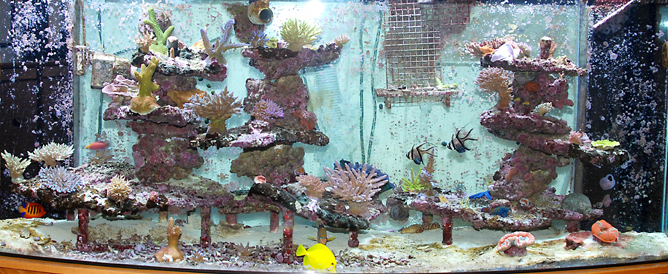
Total Organic Carbon (TOC) and the Reef Aquarium: an Initial Survey, Part I
Department of Chemistry, The Pennsylvania State University, University Park, PA 16802. Ken and Kelly report on their work on Total Organic Carbon and how it relates to the reef aquarium.
Total Organic Carbon Pt 2
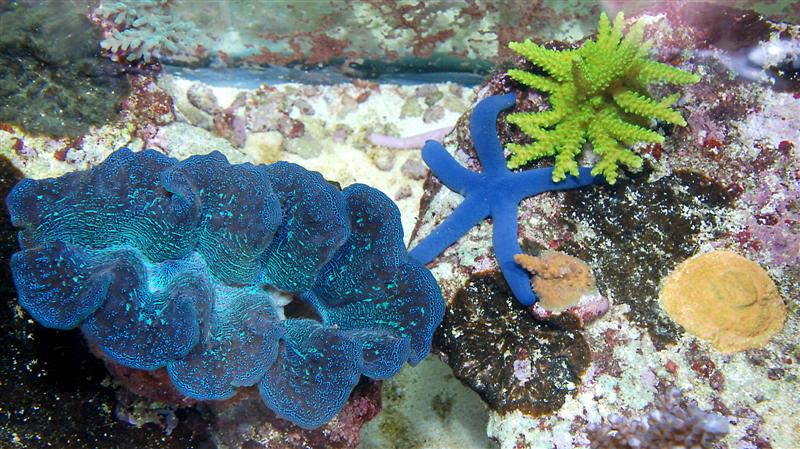
Total Organic Carbon (TOC) and the Reef Aquarium: an Initial Survey, Part II
Department of Chemistry, The Pennsylvania State University, University Park, PA 16802. Ken and Kelly continue to report on their work on Total Organic Carbon and how it relates to the reef aquarium.
Protein Skimmer Performance, Pt 1
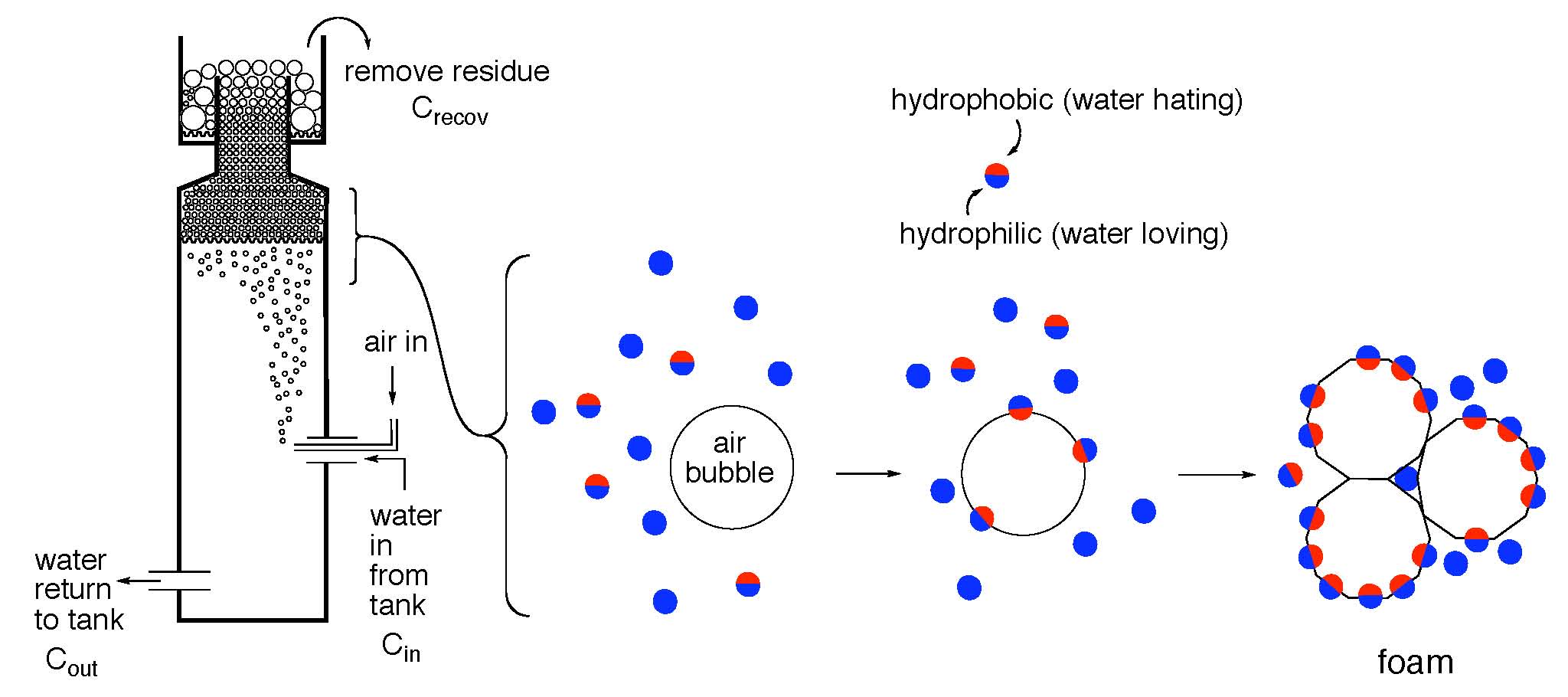
The Development of a Method for the Quantitative Evaluation of Protein Skimmer Performance
Department of Chemistry, The Pennsylvania State University, University Park, PA 16802. Protein skimmers have become indispensable for many aquarists who strive to maintain the high water quality necessary to keep stony corals.
Protein Skimmer Performance, Pt 2
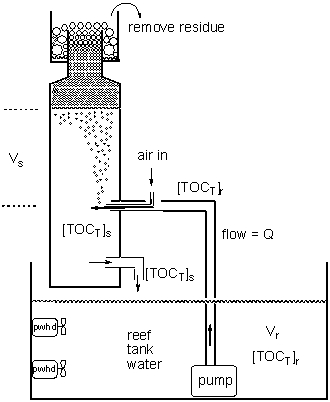
Further Studies on Protein Skimmer Performance
Department of Chemistry, The Pennsylvania State University, University Park, PA 16802. Many factors contribute to the 'value' of a skimmer to an aquarist, including quality of construction, size, footprint, noise level, ease of cleaning, energy efficiency of the pump, and of course, the ability...
Elemental Analysis of Skimmate
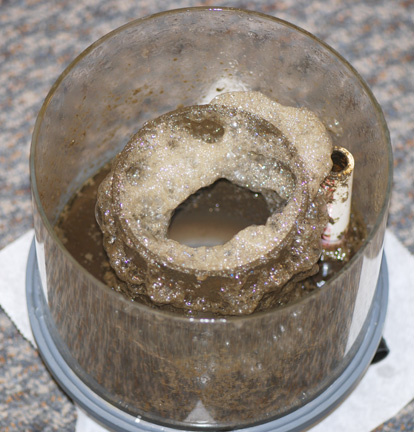
Elemental Analysis of Skimmate: What Does a Protein Skimmer Actually Remove from Aquarium Water?
Department of Chemistry, The Pennsylvania State University, University Park, PA 16802. The chemical/elemental composition of skimmate generated by an H&S 200-1260 skimmer on a 175-gallon reef tank over the course of several days or a week had some surprises.
Bacterial Counts in Reef Aquarium Water
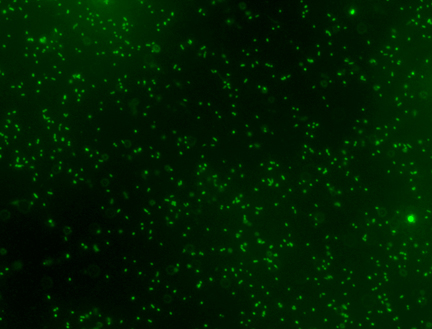
Bacterial Counts in Reef Aquarium Water: Baseline Values and Modulation by Carbon Dosing, Protein Skimming, and Granular Activated Carbon Filtration
What are the bacteria populations in the water column of reef tanks, and how does that value compare with bacterial counts in authentic reef water? Does carbon dosing indeed increase water column bacteria populations (i.e., is growth carbon limited)? Does mechanical filtration (protein skimming...
Indirect effects of algae on coral: algae‐mediated, microbe‐induced coral mortality
Error - Cookies Turned Off
Influence of coral and algal exudates on microbially mediated reef metabolism.
Coral DOC improves oxygen (autotrophy), algae DOC reduces oxygen (heterotrophy).
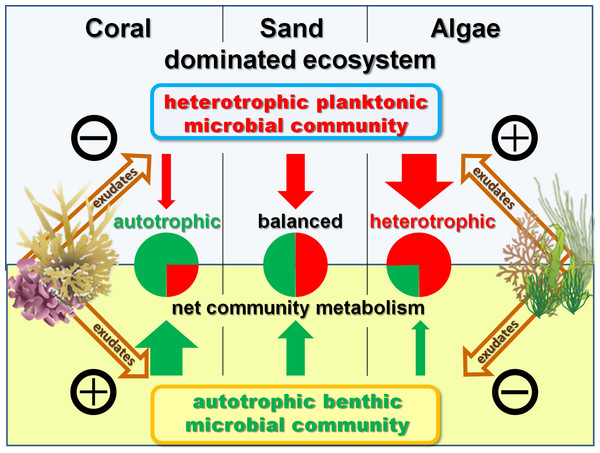
Influence of coral and algal exudates on microbially mediated reef metabolism
Benthic primary producers in tropical reef ecosystems can alter biogeochemical cycling and microbial processes in the surrounding seawater. In order to quantify these influences, we measured rates of photosynthesis, respiration, and dissolved organic carbon (DOC) exudate release by the dominant...
Role of elevated organic carbon levels and microbial activity in coral mortality
Effects of Coral Reef Benthic Primary Producers on Dissolved Organic Carbon and Microbial Activity
Algae releases significantly more DOC into the water than coral.
Effects of Coral Reef Benthic Primary Producers on Dissolved Organic Carbon and Microbial Activity
Benthic primary producers in marine ecosystems may significantly alter biogeochemical cycling and microbial processes in their surrounding environment. To examine these interactions, we studied dissolved organic matter release by dominant benthic taxa and subsequent microbial remineralization in...
Pathologies and mortality rates caused by organic carbon and nutrient stressors in three Caribbean coral species.
DOC caused coral death but not high nitrates, phosphates or ammonium.
Visualization of oxygen distribution patterns caused by coral and algae
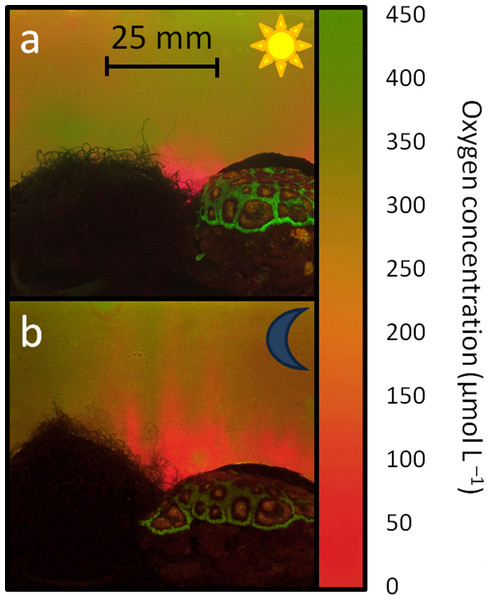
Visualization of oxygen distribution patterns caused by coral and algae
Planar optodes were used to visualize oxygen distribution patterns associated with a coral reef associated green algae (Chaetomorpha sp.) and a hermatypic coral (Favia sp.) separately, as standalone organisms, and placed in close proximity mimicking coral-algal interactions. Oxygen patterns were...
Biological oxygen demand optode analysis of coral reef-associated microbial communities exposed to algal exudates
Exposure to exudates derived from turf algae stimulated higher oxygen drawdown by the coral-associated bacteria.
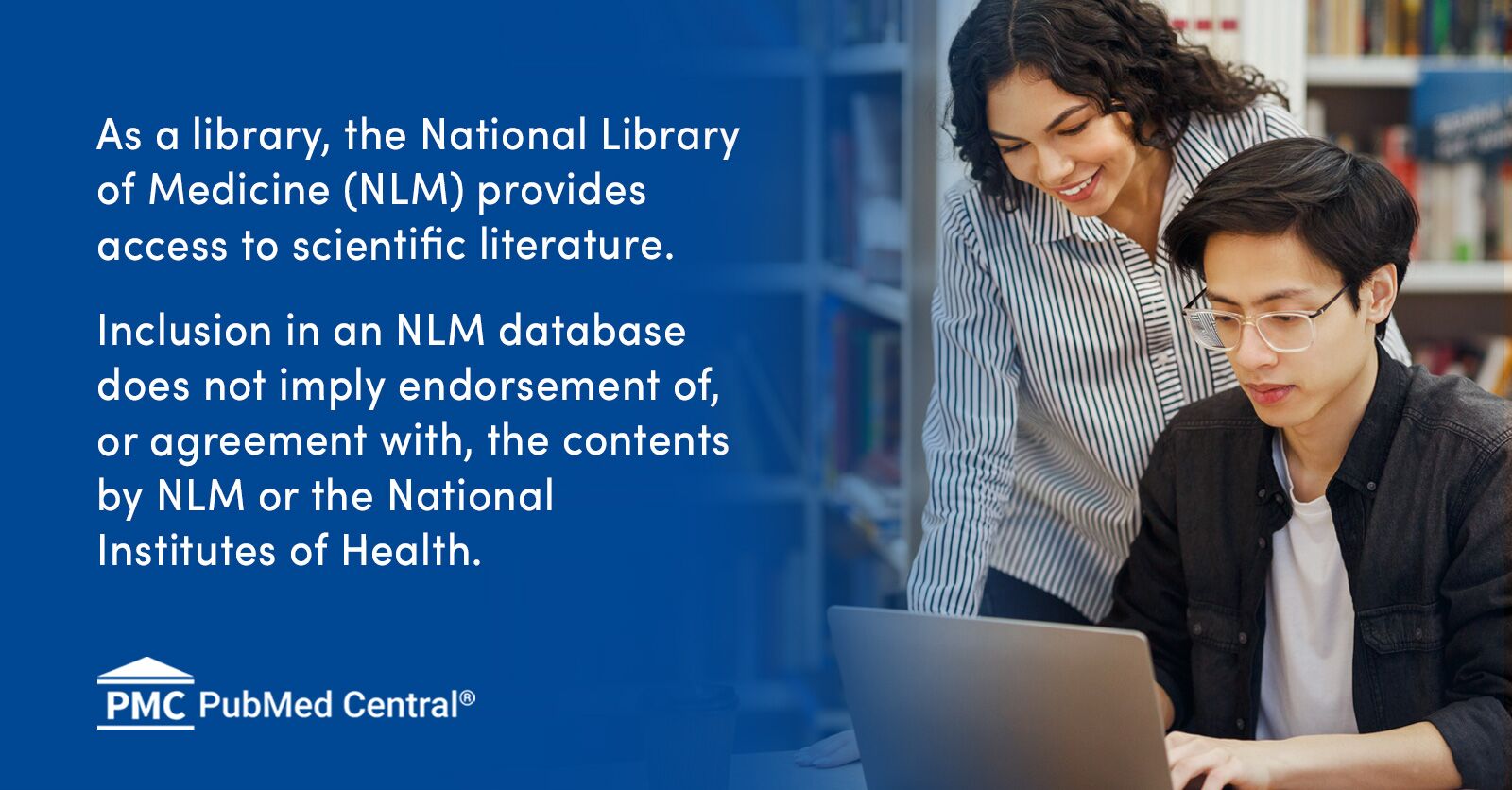
Biological oxygen demand optode analysis of coral reef-associated microbial communities exposed to algal exudates
Algae-derived dissolved organic matter has been hypothesized to induce mortality of reef building corals. One proposed killing mechanism is a zone of hypoxia created by rapidly growing microbes. To investigate this hypothesis, biological oxygen demand ...
Microbial ecology: Algae feed a shift on coral reefs
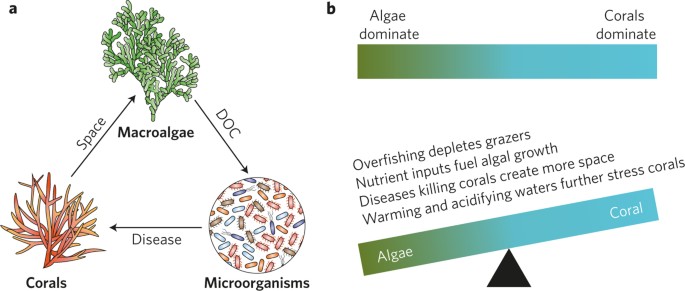
Microbial ecology: Algae feed a shift on coral reefs - Nature Microbiology
Human pressures on coral reefs are giving macroalgae a competitive advantage over reef-building corals. These algae support larger, and potentially pathogenic, microbial populations that are metabolically primed for less-efficient, yet faster, carbohydrate remineralization, perpetuating a...
Coral and macroalgal exudates vary in neutral sugar composition and differentially enrich reef bacterioplankton lineages.
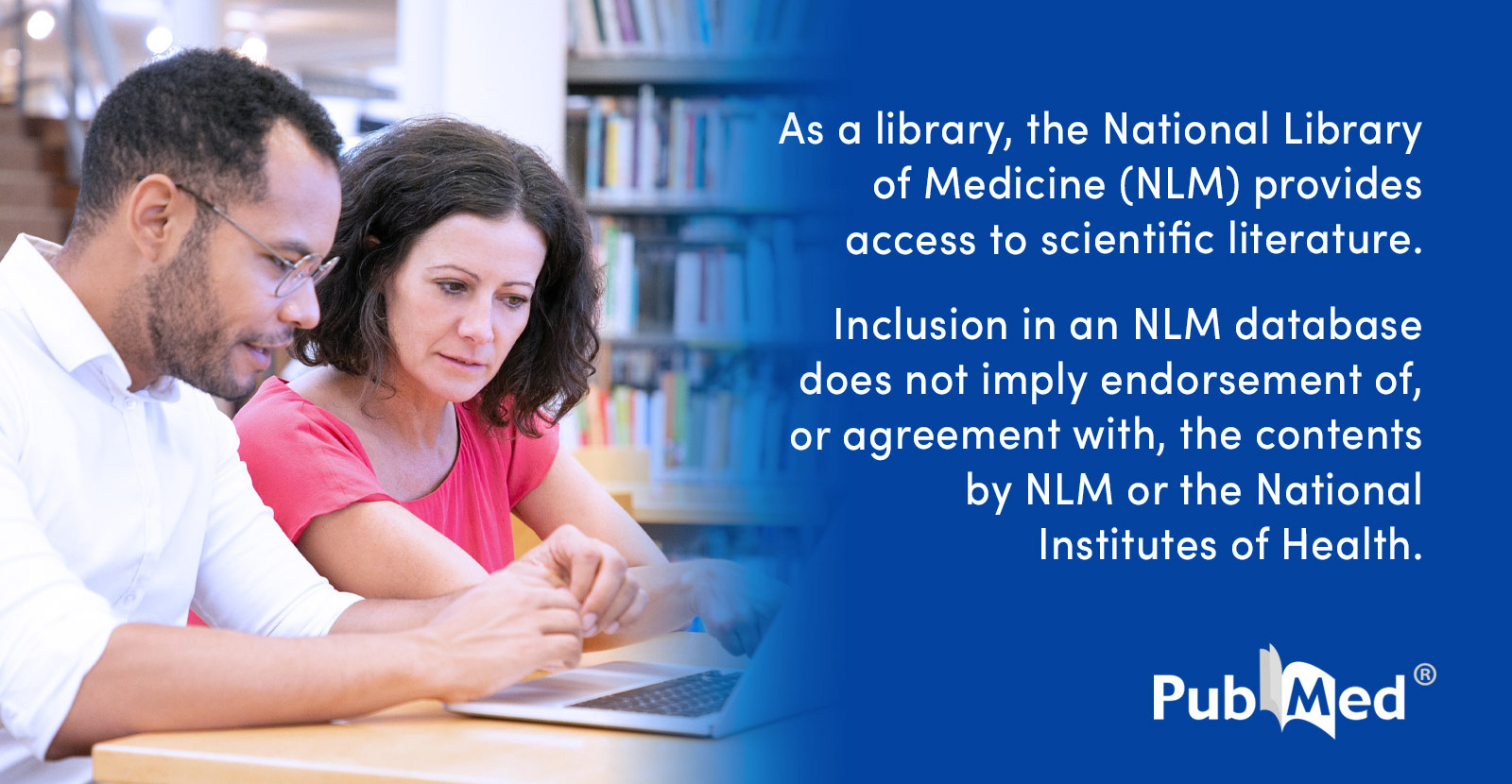
Coral and macroalgal exudates vary in neutral sugar composition and differentially enrich reef bacterioplankton lineages - PubMed
Increasing algal cover on tropical reefs worldwide may be maintained through feedbacks whereby algae outcompete coral by altering microbial activity. We hypothesized that algae and coral release compositionally distinct exudates that differentially alter bacterioplankton growth and community...
Sugar enrichment provides evidence for a role of nitrogen fixation in coral bleaching
Error - Cookies Turned Off
Elevated ammonium delays the impairment of the coral-dinoflagellate symbiosis during labile carbon pollution
(here's an argument for maintaining heavy fish loads if you're carbon dosing)
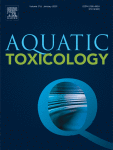
Elevated ammonium delays the impairment of the coral-dinoflagellate symbiosis during labile carbon pollution
Labile dissolved organic carbon (DOC) is a major pollutant in coastal marine environments affected by anthropogenic impacts, and may significantly con…
Excess labile carbon promotes the expression of virulence factors in coral reef bacterioplankton
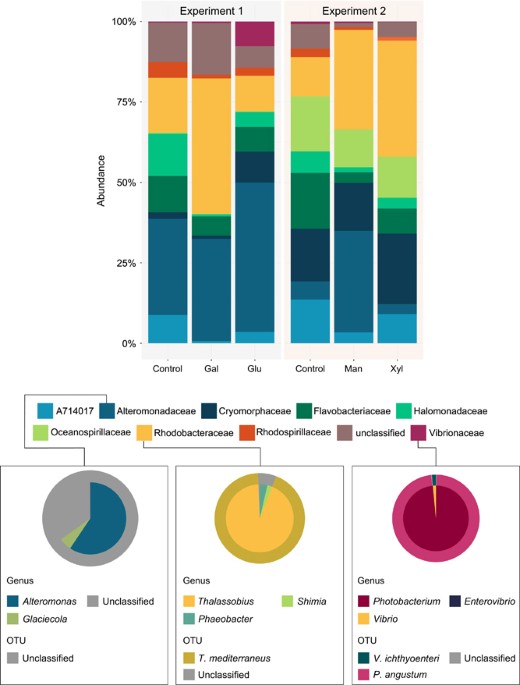
Excess labile carbon promotes the expression of virulence factors in coral reef bacterioplankton - The ISME Journal
Coastal pollution and algal cover are increasing on many coral reefs, resulting in higher dissolved organic carbon (DOC) concentrations. High DOC concentrations strongly affect microbial activity in reef waters and select for copiotrophic, often potentially virulent microbial populations. High...
Unseen players shape benthic competition on coral reefs.

Unseen players shape benthic competition on coral reefs - PubMed
Recent work has shown that hydrophilic and hydrophobic organic matter (OM) from algae disrupts the function of the coral holobiont and promotes the invasion of opportunistic pathogens, leading to coral morbidity and mortality. Here we refer to these dynamics as the (3)DAM [dissolved organic...
Allelochemicals Produced by Brown Macroalgae of the Lobophora Genus Are Active against Coral Larvae and Associated Bacteria, Supporting Pathogenic Shifts to Vibrio Dominance.

Allelochemicals Produced by Brown Macroalgae of the Lobophora Genus Are Active against Coral Larvae and Associated Bacteria, Supporting Pathogenic Shifts to Vibrio Dominance - PubMed
Diverse microbial communities associate with coral tissues and mucus, providing important protective and nutritional services, but once disturbed, the microbial equilibrium may shift from a beneficial state to one that is detrimental or pathogenic. Macroalgae (e.g., seaweeds) can physically and...
Macroalgae decrease growth and alter microbial community structure of the reef-building coral, Porites astreoides.

Macroalgae decrease growth and alter microbial community structure of the reef-building coral, Porites astreoides - PubMed
With the continued and unprecedented decline of coral reefs worldwide, evaluating the factors that contribute to coral demise is of critical importance. As coral cover declines, macroalgae are becoming more common on tropical reefs. Interactions between these macroalgae and corals may alter the...
Macroalgal extracts induce bacterial assemblage shifts and sublethal tissue stress in Caribbean corals.

Macroalgal extracts induce bacterial assemblage shifts and sublethal tissue stress in Caribbean corals - PubMed
Benthic macroalgae can be abundant on present-day coral reefs, especially where rates of herbivory are low and/or dissolved nutrients are high. This study investigated the impact of macroalgal extracts on both coral-associated bacterial assemblages and sublethal stress response of corals. Crude...
Biophysical and physiological processes causing oxygen loss from coral reefs.
Global microbialization of coral reefs
DDAM Proven
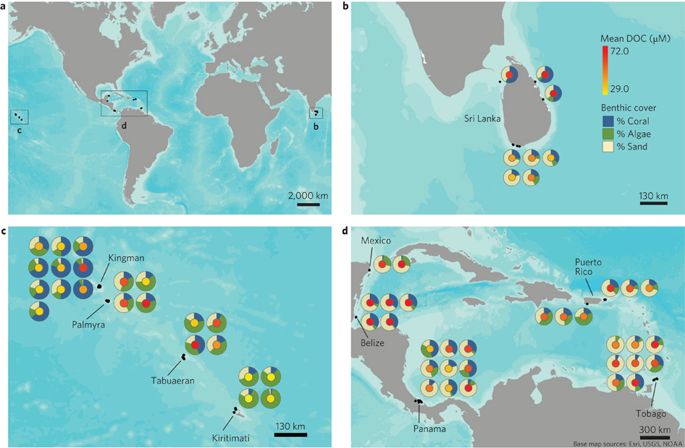
Global microbialization of coral reefs - Nature Microbiology
Analysis of 60 sites in three ocean basins suggests that overgrowth of fleshy algae on coral reefs supports higher microbial abundances dominated by copiotrophic, potentially pathogenic bacteria via the provision of dissolved inorganic carbon.
Coral Reef Microorganisms in a Changing Climate, Fig 3

Coral Reef Microorganisms in a Changing Climate
Coral reefs are one of the most diverse and productive ecosystems on the planet, yet they have suffered tremendous losses due to anthropogenic disturbances and are predicted to be one of the most adversely affected habitats under future climate change ...
Ecosystem Microbiology of Coral Reefs: Linking Genomic, Metabolomic, and Biogeochemical Dynamics from Animal Symbioses to Reefscape Processes
Because sponges are essential players in the carbon, nitrogen and phosphorus cycle(s) on reefs here's some links to research done with them.
Element cycling on tropical coral reefs.
This is Jasper de Geoij's ground breaking research on reef sponge finding some species process labile DOC 1000X faster than bacterioplankton. (The introduction is in Dutch but the content is in English.)
Sponge symbionts and the marine P cycle
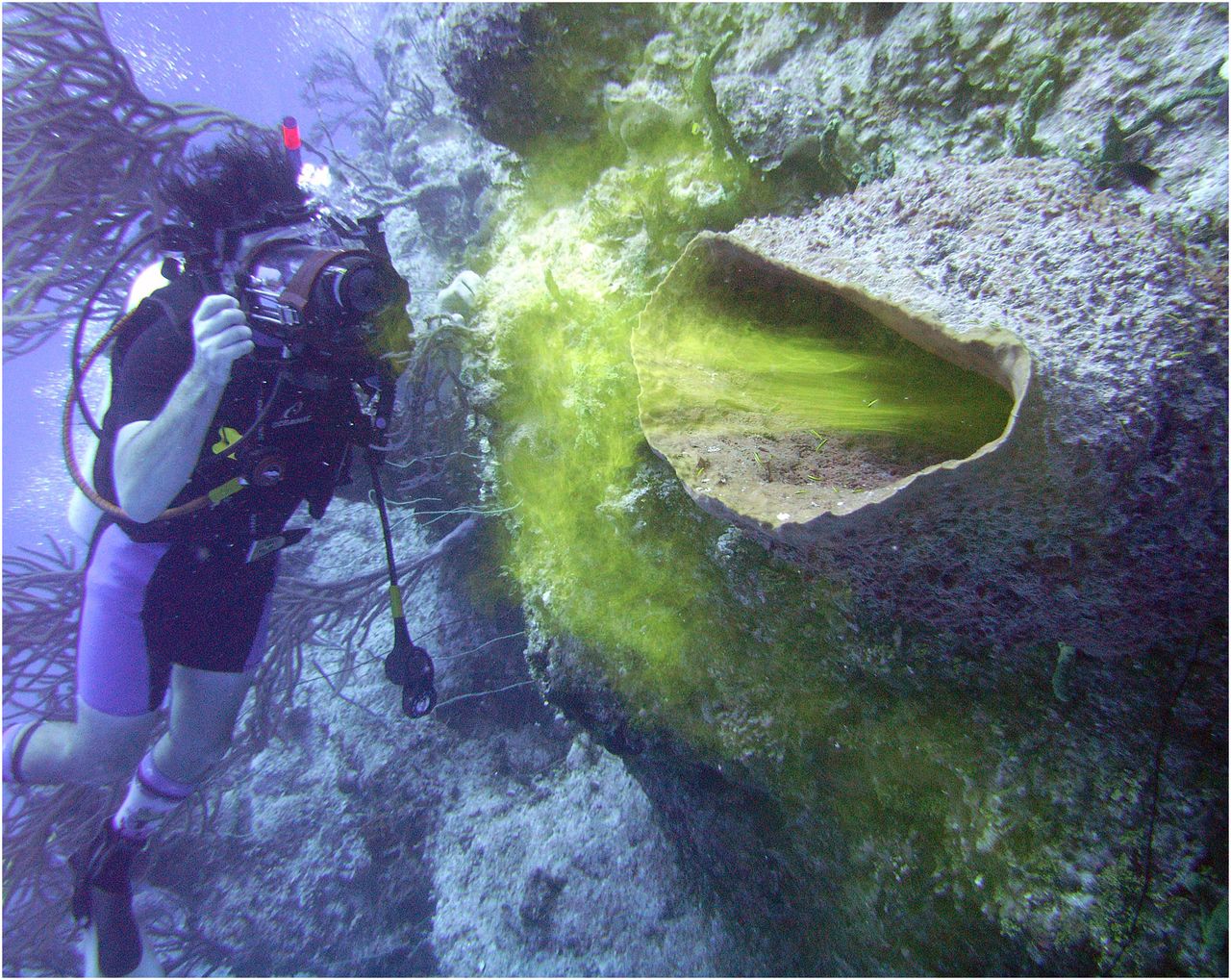
Sponge symbionts and the marine P cycle
Marine sponges are ubiquitous colonizers of shallow, clear-water environments in the oceans (1, 2). Sponges have emerged as significant mediators of biogeochemical fluxes in coastal zones by virtue of respiring organic matter and facilitating both the consumption and release of nutrients (3, 4)...
Phosphorus sequestration in the form of polyphosphate by microbial symbionts in marine sponges
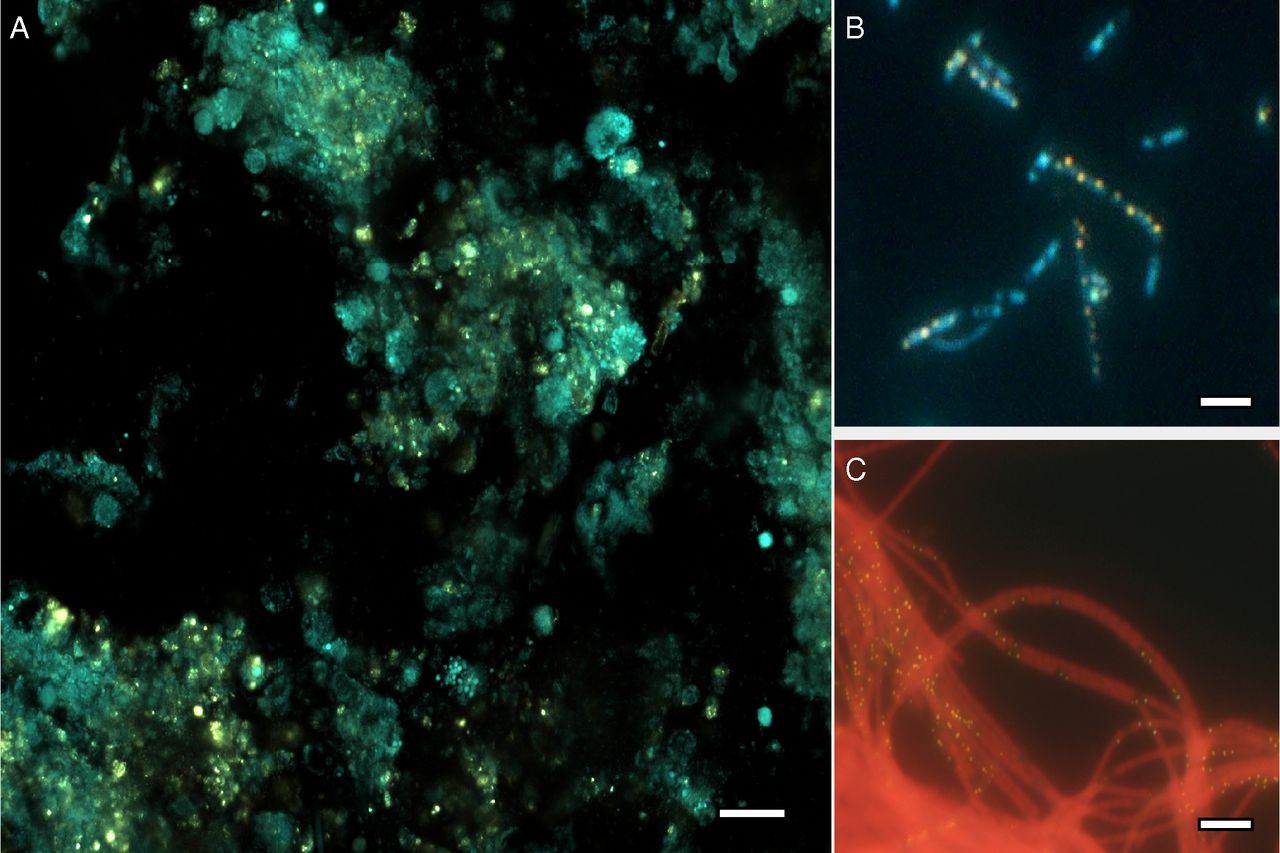
Phosphorus sequestration in the form of polyphosphate by microbial symbionts in marine sponges
Coral reefs are highly productive ecosystems that raise a conundrum called “Darwin’s paradox”: How can high production flourish in low-nutrient conditions? We show here that in three abundant Caribbean sponges, the granules that have been commonly observed in sponge tissue for decades are...
Differential recycling of coral and algal dissolved organic matter via the sponge loop.
Sponges treat DOC from algae differently than DOC from corals
Error - Cookies Turned Off
A Vicious Circle? Altered Carbon and Nutrient Cycling May Explain the Low Resilience of Caribbean Coral Reefs
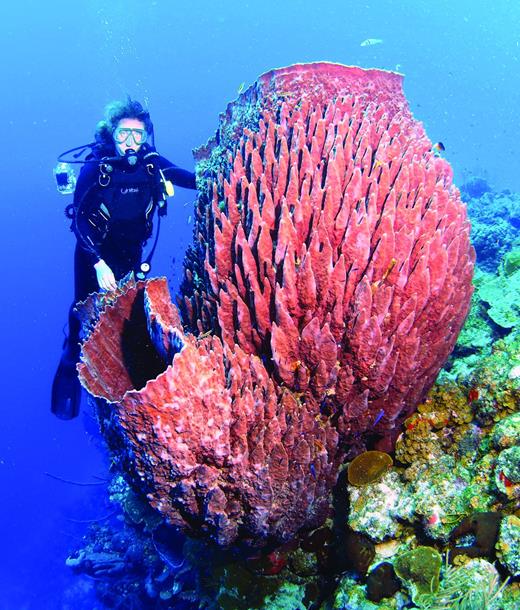
A Vicious Circle? Altered Carbon and Nutrient Cycling May Explain the Low Resilience of Caribbean Coral Reefs
Coral reefs are economically important ecosystems that have suffered unprecedented losses of corals in the recent past. Why have Caribbean reefs in particu
Surviving in a Marine Desert The Sponge Loop Retains Resources Within Coral Reefs
Dissolved organic carbon and nitrogen are quickly processed by sponges and released back into the reef food web in hours as carbon and nitrogen rich detritus.
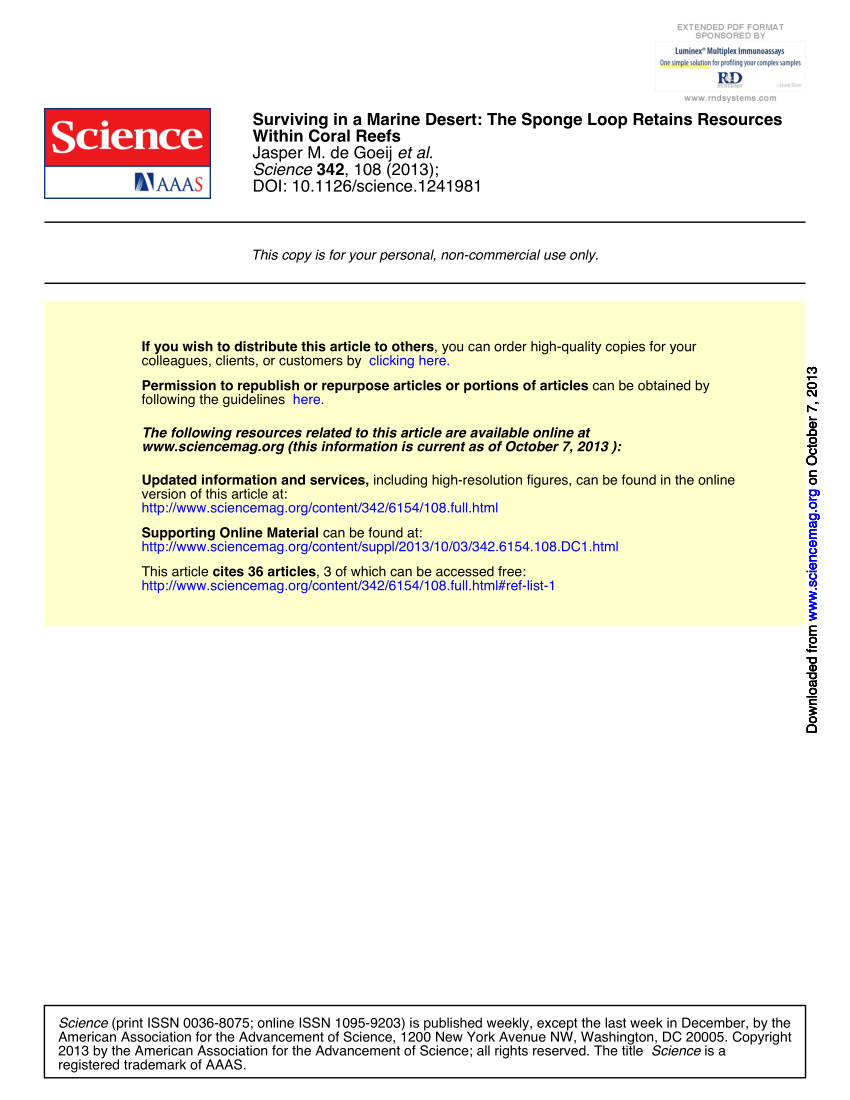
(PDF) 2013 deGoeij Science Sponge loop
PDF | On Jun 23, 2015, Jasper M de Goeij and others published 2013 deGoeij Science Sponge loop | Find, read and cite all the research you need on ResearchGate
Natural Diet of Coral-Excavating Sponges Consists Mainly of Dissolved Organic Carbon (DOC)

Natural Diet of Coral-Excavating Sponges Consists Mainly of Dissolved Organic Carbon (DOC)
Coral-excavating sponges are the most important bioeroders on Caribbean reefs and increase in abundance throughout the region. This increase is commonly attributed to a concomitant increase in food availability due to eutrophication and pollution. We ...
The Role of Marine Sponges in Carbon and Nitrogen Cycles of COral Reefs and Nearshore Environments.
The role of marine sponges in carbon and nitrogen cycles of coral reef and nearshore environments - ProQuest
Explore millions of resources from scholarly journals, books, newspapers, videos and more, on the ProQuest Platform.
And since we're discussing favorable and not so favorable bacteria here's a paper looking at how different corals and polyps are influencing the bacteria in the water column.
Aura-biomes are present in the water layer above coral reef benthic macro-organisms

Aura-biomes are present in the water layer above coral reef benthic macro-organisms - PubMed
As coral reef habitats decline worldwide, some reefs are transitioning from coral- to algal-dominated benthos with the exact cause for this shift remaining elusive. Increases in the abundance of microbes in the water column has been correlated with an increase in coral disease and reduction in...
- Joined
- Feb 15, 2019
- Messages
- 2,444
- Reaction score
- 3,357
5ml per day in a 125g is basically nothing. Maybe that'll work in a 125g with a single damselfish but it didn't work in my 120g total system. For reference, I was dosing 20ml of diy nopox per day plus enough P04 to keep it at .08ppm. I had around 15, 2" sized fish in that system.
I'll take next week off to read all this and get back to you, lol!I haven't found any research showing adding labile DOC, aka carbon dosing, is beneficial for corals. This paper shows even the DOC from corals when concentrated has severe negative effects and was reiterated be Ken Feldman in his first article on Total Organic Carbon. (A telling comment on how some researchers view labile DOC is heard by Rebecca Vega Thurber, in the question and answer section of the above posted video, "A microbiological View of Coral Decline" refer to "carbon burden or load" (@ 1:02:16) as a possible requirement for larval corals to become infected.) Since Kline's research was done there's many more paper showing how labile DOC kills corals. It can promote pathogenic shifts in coral microbiomes causing various diseases and it can kill by causing bacterial blooms in coral microbiomes that literally suffocate the coral. This later one has the additonal suport of research showing heterotrophic bacteria are able increase thier numbers useing refractory DOC as an additional source of food with the use of labile DOC (counter intuitively degraded reefs were found with NO DOC, labile or refractory).
Two issues that don't seem to be known or considered is coloration is not indicative of a healthy coral and the role of sponges in moderating DOC. Unfortunately it's become dogma for many that brightly colored corals means "healthy" and I've seen very little consideration given to what actually may be healthy, see my post, #59, here. Some sponge species can process labile DOC 1000X faster than the bacteria in the water and convert some of it into Dissolved Inorganic Carbon, DIC, most of which is in the form HCO3 or bicarbonate (and it seems it's anybodys guess what carbon dosing is actually doing when dosed). Unfortunately, sponges that feed off labile DOC have also been shown to differentially process DOC from algae and from corals creating feedback loops that support algae shifts on reefs.
As I see it, the only DOC we want in a reef system is what corals produce themselves. Water changes are needed to reduce micriobial populations and labile DOC letting corals produce and promote what is beneficial for them and to reduce the refractory DOC that heterotrohpic bacteria can use to proliferate.
The links I posted above for Rohwer's book and video are the best place to start to understand these processes better. Here's an additional data bomb if you still want to dig deeper into the science after studying his links.
Feldman's links:
Total Organic Carbon Pt 1

Total Organic Carbon (TOC) and the Reef Aquarium: an Initial Survey, Part I
Department of Chemistry, The Pennsylvania State University, University Park, PA 16802. Ken and Kelly report on their work on Total Organic Carbon and how it relates to the reef aquarium.www.advancedaquarist.com
Total Organic Carbon Pt 2

Total Organic Carbon (TOC) and the Reef Aquarium: an Initial Survey, Part II
Department of Chemistry, The Pennsylvania State University, University Park, PA 16802. Ken and Kelly continue to report on their work on Total Organic Carbon and how it relates to the reef aquarium.www.advancedaquarist.com
Protein Skimmer Performance, Pt 1

The Development of a Method for the Quantitative Evaluation of Protein Skimmer Performance
Department of Chemistry, The Pennsylvania State University, University Park, PA 16802. Protein skimmers have become indispensable for many aquarists who strive to maintain the high water quality necessary to keep stony corals.reefs.com
Protein Skimmer Performance, Pt 2

Further Studies on Protein Skimmer Performance
Department of Chemistry, The Pennsylvania State University, University Park, PA 16802. Many factors contribute to the 'value' of a skimmer to an aquarist, including quality of construction, size, footprint, noise level, ease of cleaning, energy efficiency of the pump, and of course, the ability...reefs.com
Elemental Analysis of Skimmate

Elemental Analysis of Skimmate: What Does a Protein Skimmer Actually Remove from Aquarium Water?
Department of Chemistry, The Pennsylvania State University, University Park, PA 16802. The chemical/elemental composition of skimmate generated by an H&S 200-1260 skimmer on a 175-gallon reef tank over the course of several days or a week had some surprises.reefs.com
Bacterial Counts in Reef Aquarium Water

Bacterial Counts in Reef Aquarium Water: Baseline Values and Modulation by Carbon Dosing, Protein Skimming, and Granular Activated Carbon Filtration
What are the bacteria populations in the water column of reef tanks, and how does that value compare with bacterial counts in authentic reef water? Does carbon dosing indeed increase water column bacteria populations (i.e., is growth carbon limited)? Does mechanical filtration (protein skimming...reefs.com
Indirect effects of algae on coral: algae‐mediated, microbe‐induced coral mortality
Error - Cookies Turned Off
onlinelibrary.wiley.com
Influence of coral and algal exudates on microbially mediated reef metabolism.
Coral DOC improves oxygen (autotrophy), algae DOC reduces oxygen (heterotrophy).

Influence of coral and algal exudates on microbially mediated reef metabolism
Benthic primary producers in tropical reef ecosystems can alter biogeochemical cycling and microbial processes in the surrounding seawater. In order to quantify these influences, we measured rates of photosynthesis, respiration, and dissolved organic carbon (DOC) exudate release by the dominant...peerj.com
Role of elevated organic carbon levels and microbial activity in coral mortality
Effects of Coral Reef Benthic Primary Producers on Dissolved Organic Carbon and Microbial Activity
Algae releases significantly more DOC into the water than coral.
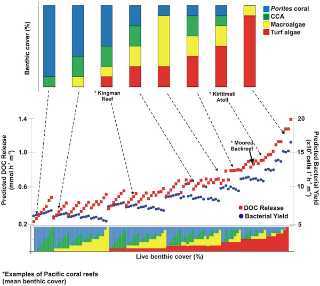
Effects of Coral Reef Benthic Primary Producers on Dissolved Organic Carbon and Microbial Activity
Benthic primary producers in marine ecosystems may significantly alter biogeochemical cycling and microbial processes in their surrounding environment. To examine these interactions, we studied dissolved organic matter release by dominant benthic taxa and subsequent microbial remineralization in...journals.plos.org
Pathologies and mortality rates caused by organic carbon and nutrient stressors in three Caribbean coral species.
DOC caused coral death but not high nitrates, phosphates or ammonium.
Visualization of oxygen distribution patterns caused by coral and algae

Visualization of oxygen distribution patterns caused by coral and algae
Planar optodes were used to visualize oxygen distribution patterns associated with a coral reef associated green algae (Chaetomorpha sp.) and a hermatypic coral (Favia sp.) separately, as standalone organisms, and placed in close proximity mimicking coral-algal interactions. Oxygen patterns were...peerj.com
Biological oxygen demand optode analysis of coral reef-associated microbial communities exposed to algal exudates
Exposure to exudates derived from turf algae stimulated higher oxygen drawdown by the coral-associated bacteria.

Biological oxygen demand optode analysis of coral reef-associated microbial communities exposed to algal exudates
Algae-derived dissolved organic matter has been hypothesized to induce mortality of reef building corals. One proposed killing mechanism is a zone of hypoxia created by rapidly growing microbes. To investigate this hypothesis, biological oxygen demand ...www.ncbi.nlm.nih.gov
Microbial ecology: Algae feed a shift on coral reefs

Microbial ecology: Algae feed a shift on coral reefs - Nature Microbiology
Human pressures on coral reefs are giving macroalgae a competitive advantage over reef-building corals. These algae support larger, and potentially pathogenic, microbial populations that are metabolically primed for less-efficient, yet faster, carbohydrate remineralization, perpetuating a...www.nature.com
Coral and macroalgal exudates vary in neutral sugar composition and differentially enrich reef bacterioplankton lineages.

Coral and macroalgal exudates vary in neutral sugar composition and differentially enrich reef bacterioplankton lineages - PubMed
Increasing algal cover on tropical reefs worldwide may be maintained through feedbacks whereby algae outcompete coral by altering microbial activity. We hypothesized that algae and coral release compositionally distinct exudates that differentially alter bacterioplankton growth and community...www.ncbi.nlm.nih.gov
Sugar enrichment provides evidence for a role of nitrogen fixation in coral bleaching
Error - Cookies Turned Off
onlinelibrary.wiley.com
Elevated ammonium delays the impairment of the coral-dinoflagellate symbiosis during labile carbon pollution
(here's an argument for maintaining heavy fish loads if you're carbon dosing)

Elevated ammonium delays the impairment of the coral-dinoflagellate symbiosis during labile carbon pollution
Labile dissolved organic carbon (DOC) is a major pollutant in coastal marine environments affected by anthropogenic impacts, and may significantly con…www.sciencedirect.com
Excess labile carbon promotes the expression of virulence factors in coral reef bacterioplankton

Excess labile carbon promotes the expression of virulence factors in coral reef bacterioplankton - The ISME Journal
Coastal pollution and algal cover are increasing on many coral reefs, resulting in higher dissolved organic carbon (DOC) concentrations. High DOC concentrations strongly affect microbial activity in reef waters and select for copiotrophic, often potentially virulent microbial populations. High...www.nature.com
Unseen players shape benthic competition on coral reefs.

Unseen players shape benthic competition on coral reefs - PubMed
Recent work has shown that hydrophilic and hydrophobic organic matter (OM) from algae disrupts the function of the coral holobiont and promotes the invasion of opportunistic pathogens, leading to coral morbidity and mortality. Here we refer to these dynamics as the (3)DAM [dissolved organic...www.ncbi.nlm.nih.gov
Allelochemicals Produced by Brown Macroalgae of the Lobophora Genus Are Active against Coral Larvae and Associated Bacteria, Supporting Pathogenic Shifts to Vibrio Dominance.

Allelochemicals Produced by Brown Macroalgae of the Lobophora Genus Are Active against Coral Larvae and Associated Bacteria, Supporting Pathogenic Shifts to Vibrio Dominance - PubMed
Diverse microbial communities associate with coral tissues and mucus, providing important protective and nutritional services, but once disturbed, the microbial equilibrium may shift from a beneficial state to one that is detrimental or pathogenic. Macroalgae (e.g., seaweeds) can physically and...www.ncbi.nlm.nih.gov
Macroalgae decrease growth and alter microbial community structure of the reef-building coral, Porites astreoides.

Macroalgae decrease growth and alter microbial community structure of the reef-building coral, Porites astreoides - PubMed
With the continued and unprecedented decline of coral reefs worldwide, evaluating the factors that contribute to coral demise is of critical importance. As coral cover declines, macroalgae are becoming more common on tropical reefs. Interactions between these macroalgae and corals may alter the...www.ncbi.nlm.nih.gov
Macroalgal extracts induce bacterial assemblage shifts and sublethal tissue stress in Caribbean corals.

Macroalgal extracts induce bacterial assemblage shifts and sublethal tissue stress in Caribbean corals - PubMed
Benthic macroalgae can be abundant on present-day coral reefs, especially where rates of herbivory are low and/or dissolved nutrients are high. This study investigated the impact of macroalgal extracts on both coral-associated bacterial assemblages and sublethal stress response of corals. Crude...www.ncbi.nlm.nih.gov
Biophysical and physiological processes causing oxygen loss from coral reefs.
Global microbialization of coral reefs
DDAM Proven

Global microbialization of coral reefs - Nature Microbiology
Analysis of 60 sites in three ocean basins suggests that overgrowth of fleshy algae on coral reefs supports higher microbial abundances dominated by copiotrophic, potentially pathogenic bacteria via the provision of dissolved inorganic carbon.www.nature.com
Coral Reef Microorganisms in a Changing Climate, Fig 3

Coral Reef Microorganisms in a Changing Climate
Coral reefs are one of the most diverse and productive ecosystems on the planet, yet they have suffered tremendous losses due to anthropogenic disturbances and are predicted to be one of the most adversely affected habitats under future climate change ...www.ncbi.nlm.nih.gov
Ecosystem Microbiology of Coral Reefs: Linking Genomic, Metabolomic, and Biogeochemical Dynamics from Animal Symbioses to Reefscape Processes
Because sponges are essential players in the carbon, nitrogen and phosphorus cycle(s) on reefs here's some links to research done with them.
Element cycling on tropical coral reefs.
This is Jasper de Geoij's ground breaking research on reef sponge finding some species process labile DOC 1000X faster than bacterioplankton. (The introduction is in Dutch but the content is in English.)
Sponge symbionts and the marine P cycle

Sponge symbionts and the marine P cycle
Marine sponges are ubiquitous colonizers of shallow, clear-water environments in the oceans (1, 2). Sponges have emerged as significant mediators of biogeochemical fluxes in coastal zones by virtue of respiring organic matter and facilitating both the consumption and release of nutrients (3, 4)...www.pnas.org
Phosphorus sequestration in the form of polyphosphate by microbial symbionts in marine sponges

Phosphorus sequestration in the form of polyphosphate by microbial symbionts in marine sponges
Coral reefs are highly productive ecosystems that raise a conundrum called “Darwin’s paradox”: How can high production flourish in low-nutrient conditions? We show here that in three abundant Caribbean sponges, the granules that have been commonly observed in sponge tissue for decades are...www.pnas.org
Differential recycling of coral and algal dissolved organic matter via the sponge loop.
Sponges treat DOC from algae differently than DOC from corals
Error - Cookies Turned Off
besjournals.onlinelibrary.wiley.com
A Vicious Circle? Altered Carbon and Nutrient Cycling May Explain the Low Resilience of Caribbean Coral Reefs

A Vicious Circle? Altered Carbon and Nutrient Cycling May Explain the Low Resilience of Caribbean Coral Reefs
Coral reefs are economically important ecosystems that have suffered unprecedented losses of corals in the recent past. Why have Caribbean reefs in particuacademic.oup.com
Surviving in a Marine Desert The Sponge Loop Retains Resources Within Coral Reefs
Dissolved organic carbon and nitrogen are quickly processed by sponges and released back into the reef food web in hours as carbon and nitrogen rich detritus.

(PDF) 2013 deGoeij Science Sponge loop
PDF | On Jun 23, 2015, Jasper M de Goeij and others published 2013 deGoeij Science Sponge loop | Find, read and cite all the research you need on ResearchGatewww.researchgate.net
Natural Diet of Coral-Excavating Sponges Consists Mainly of Dissolved Organic Carbon (DOC)

Natural Diet of Coral-Excavating Sponges Consists Mainly of Dissolved Organic Carbon (DOC)
Coral-excavating sponges are the most important bioeroders on Caribbean reefs and increase in abundance throughout the region. This increase is commonly attributed to a concomitant increase in food availability due to eutrophication and pollution. We ...www.ncbi.nlm.nih.gov
The Role of Marine Sponges in Carbon and Nitrogen Cycles of COral Reefs and Nearshore Environments.
The role of marine sponges in carbon and nitrogen cycles of coral reef and nearshore environments - ProQuest
Explore millions of resources from scholarly journals, books, newspapers, videos and more, on the ProQuest Platform.search.proquest.com
And since we're discussing favorable and not so favorable bacteria here's a paper looking at how different corals and polyps are influencing the bacteria in the water column.
Aura-biomes are present in the water layer above coral reef benthic macro-organisms

Aura-biomes are present in the water layer above coral reef benthic macro-organisms - PubMed
As coral reef habitats decline worldwide, some reefs are transitioning from coral- to algal-dominated benthos with the exact cause for this shift remaining elusive. Increases in the abundance of microbes in the water column has been correlated with an increase in coral disease and reduction in...www.ncbi.nlm.nih.gov
Seriously though, thanks for all the info
Similar threads
- Replies
- 2
- Views
- 82
- Replies
- 15
- Views
- 343
- Replies
- 16
- Views
- 402
- Replies
- 9
- Views
- 189
New Posts
-
Build Thread Migration from 110g Reef Savvy to RedSea Reefer-S G2+ 550
- Latest: Fish Kepeer
-
-
-
-


















